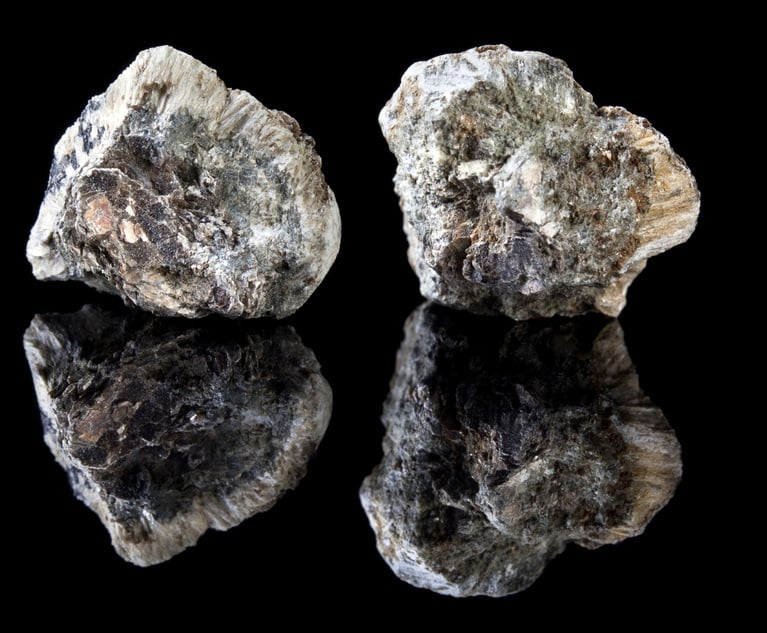Judge Doubles Overtime Awarded in Oil and Gas Workers' FLSA Case
U.S. District Judge Mark Kearney approved the eight plaintiffs' request for liquidated damages, doubling the combined amount of back overtime from approximately $498,000 to nearly $1 million.
May 01, 2018 at 04:24 PM
3 minute read

A federal judge has ordered that oil and gas workers who were awarded overtime pay at trial in a Fair Labor Standards Act case are now entitled to twice the amount the jury handed up.
U.S. District Judge Mark Kearney of the Western District of Pennsylvania approved the eight plaintiffs' request for liquidated damages, doubling the combined amount of back overtime from approximately $498,000 to nearly $1 million.
According to Kearney's opinion, the workers were employed by Oil States Energy Services to work on hydraulic fracturing sites. The plaintiffs, who filed suit under the FLSA, were the second group of three trial groups in the case.
Kearney said the first group was tried in the fall of 2017 and, following the jury's verdict in the employees' favor, he granted the employees' motion for liquidated damages. Kearney found that “Oil States did not adduce evidence of its good faith and reasonable efforts to determine whether it should pay overtime to these employees.”
The plaintiffs in the current group were tried last month and repeated the same evidence used in the first trial.
“To supplement its proofs from the first trial, Oil States hoped to adduce evidence from one of its employees—Rhonda Totten—who allegedly played a role in deciding whether to characterize the Group 2 plaintiffs as exempt from overtime,” Kearney said. “Consistent with Oil States' discovery responses, we permitted Ms. Totten to testify only as to 'knowledge of human resources support for the locations at issue.' Shortly before trial, Oil States filed an unsolicited 'report' again asking to expand Ms. Totten's testimony beyond Oil States' years of discovery representations.”
The plaintiffs moved to exclude Totten's testimony because Oil States didn't disclose her role in response to a specific discovery request and only identified her as having knowledge of human resources support for the locations at issue, Kearney said.
“Given the omnipresent issue of Oil States' decision to treat the employees as exempt, we could not liberally rewrite Oil States' years of discovery representations which did not disclose her knowledge or role in deciding the exempt status of the employees,” Kearney said. “If, as Oil States argued on the eve of trial, Ms. Totten played a central role in deciding the exempt status, it should have candidly answered the plaintiffs' April 22, 2016, Interrogatory No. 22 asking to '[i]dentify each of your employees who was involved in determining whether the … plaintiffs were subject to the overtime requirements of the Fair Labor Standards Act.'”
Kearney added, “After oral argument, we found no good cause to allow this last-minute witness although each of the five identified witnesses could testify as to Oil States' decision.”
In its motion for liquidated damages, the plaintiffs claimed Oil States did not adduce evidence of good faith.
“Oil States argues uncertainty in the law excuses its good faith review of whether the Group 2 plaintiffs are exempt from overtime. We cannot reach this far,” Kearney said. “Oil States might be closer to the required good faith if it adduced evidence of reviewing the issues and reaching some form of considered decision. There is no evidence of this effort.”
A. Patricia Diulus-Myers of Segmiller & Associates, representing Oil States, and Zachary Warren of Williams & Connolly in Washington, D.C., the plaintiffs' attorney, did not respond to requests for comment.
This content has been archived. It is available through our partners, LexisNexis® and Bloomberg Law.
To view this content, please continue to their sites.
Not a Lexis Subscriber?
Subscribe Now
Not a Bloomberg Law Subscriber?
Subscribe Now
NOT FOR REPRINT
© 2025 ALM Global, LLC, All Rights Reserved. Request academic re-use from www.copyright.com. All other uses, submit a request to [email protected]. For more information visit Asset & Logo Licensing.
You Might Like
View All
Superior Court Rejects Pa. Hospital's Challenge to $7.3M Med Mal Judgment
3 minute read
Pittsburgh Judge Rules Loan Company's Online Arbitration Agreement Unenforceable
3 minute read
Pa. High Court to Weigh Parent Company's Liability for Dissolved Subsidiary's Conduct
3 minute read
Trending Stories
- 1No Two Wildfires Alike: Lawyers Take Different Legal Strategies in California
- 2Poop-Themed Dog Toy OK as Parody, but Still Tarnished Jack Daniel’s Brand, Court Says
- 3Meet the New President of NY's Association of Trial Court Jurists
- 4Lawyers' Phones Are Ringing: What Should Employers Do If ICE Raids Their Business?
- 5Freshfields Hires Ex-SEC Corporate Finance Director in Silicon Valley
Who Got The Work
J. Brugh Lower of Gibbons has entered an appearance for industrial equipment supplier Devco Corporation in a pending trademark infringement lawsuit. The suit, accusing the defendant of selling knock-off Graco products, was filed Dec. 18 in New Jersey District Court by Rivkin Radler on behalf of Graco Inc. and Graco Minnesota. The case, assigned to U.S. District Judge Zahid N. Quraishi, is 3:24-cv-11294, Graco Inc. et al v. Devco Corporation.
Who Got The Work
Rebecca Maller-Stein and Kent A. Yalowitz of Arnold & Porter Kaye Scholer have entered their appearances for Hanaco Venture Capital and its executives, Lior Prosor and David Frankel, in a pending securities lawsuit. The action, filed on Dec. 24 in New York Southern District Court by Zell, Aron & Co. on behalf of Goldeneye Advisors, accuses the defendants of negligently and fraudulently managing the plaintiff's $1 million investment. The case, assigned to U.S. District Judge Vernon S. Broderick, is 1:24-cv-09918, Goldeneye Advisors, LLC v. Hanaco Venture Capital, Ltd. et al.
Who Got The Work
Attorneys from A&O Shearman has stepped in as defense counsel for Toronto-Dominion Bank and other defendants in a pending securities class action. The suit, filed Dec. 11 in New York Southern District Court by Bleichmar Fonti & Auld, accuses the defendants of concealing the bank's 'pervasive' deficiencies in regards to its compliance with the Bank Secrecy Act and the quality of its anti-money laundering controls. The case, assigned to U.S. District Judge Arun Subramanian, is 1:24-cv-09445, Gonzalez v. The Toronto-Dominion Bank et al.
Who Got The Work
Crown Castle International, a Pennsylvania company providing shared communications infrastructure, has turned to Luke D. Wolf of Gordon Rees Scully Mansukhani to fend off a pending breach-of-contract lawsuit. The court action, filed Nov. 25 in Michigan Eastern District Court by Hooper Hathaway PC on behalf of The Town Residences LLC, accuses Crown Castle of failing to transfer approximately $30,000 in utility payments from T-Mobile in breach of a roof-top lease and assignment agreement. The case, assigned to U.S. District Judge Susan K. Declercq, is 2:24-cv-13131, The Town Residences LLC v. T-Mobile US, Inc. et al.
Who Got The Work
Wilfred P. Coronato and Daniel M. Schwartz of McCarter & English have stepped in as defense counsel to Electrolux Home Products Inc. in a pending product liability lawsuit. The court action, filed Nov. 26 in New York Eastern District Court by Poulos Lopiccolo PC and Nagel Rice LLP on behalf of David Stern, alleges that the defendant's refrigerators’ drawers and shelving repeatedly break and fall apart within months after purchase. The case, assigned to U.S. District Judge Joan M. Azrack, is 2:24-cv-08204, Stern v. Electrolux Home Products, Inc.
Featured Firms
Law Offices of Gary Martin Hays & Associates, P.C.
(470) 294-1674
Law Offices of Mark E. Salomone
(857) 444-6468
Smith & Hassler
(713) 739-1250





